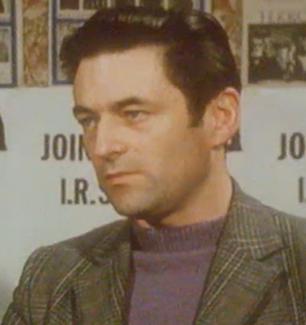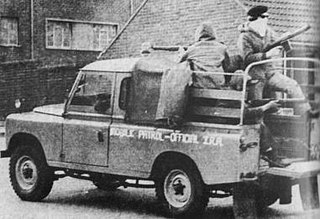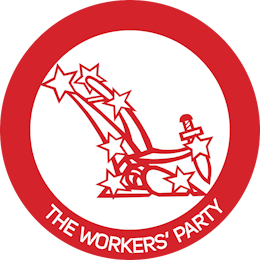Related Research Articles

The Irish National Liberation Army is an Irish republican socialist paramilitary group formed on 8 December 1974, during the 30-year period of conflict known as "the Troubles". The group seeks to remove Northern Ireland from the United Kingdom and create a socialist republic encompassing all of Ireland. With membership estimated at 80–100 at their peak, it is the paramilitary wing of the Irish Republican Socialist Party (IRSP).

Seamus Costello was an Irish politician. He was a leader of Official Sinn Féin and the Official Irish Republican Army and latterly of the Irish Republican Socialist Party (IRSP) and the Irish National Liberation Army (INLA).

The Official Irish Republican Army or Official IRA was an Irish republican paramilitary group whose goal was to remove Northern Ireland from the United Kingdom and create a "workers' republic" encompassing all of Ireland. It emerged in December 1969, shortly after the beginning of the Troubles, when the Irish Republican Army (IRA) split into two factions. The other was the Provisional IRA. Each continued to call itself simply "the IRA" and rejected the other's legitimacy.

The Workers' Party is an Irish republican, Marxist–Leninist communist party active in both the Republic of Ireland and Northern Ireland.

The Irish Republican Socialist Party or IRSP is a minor communist, Marxist–Leninist and Irish republican party in Ireland. It is often referred to as the "political wing" of the Irish National Liberation Army (INLA) paramilitary group. It was founded by former members of Official Sinn Féin in 1974 during the Troubles, but claims the legacy of the Irish Socialist Republican Party of 1896–1904.
Jimmy Brown was a militant Irish republican and drug dealer who was a member of Fianna Eireann, the Official IRA, then Irish Republican Socialist Party (IRSP)/ Irish National Liberation Army (INLA), and latterly of the Irish People's Liberation Organisation (IPLO).
James Anthony Lane is an Irish republican and socialist from Cork. He was a central figure in left-wing politics in Cork city during the 1960s to late 1980s and involved in many campaigns. He was also influential in republican circles nationally and a well known advocate of socialist republicanism of a Marxist-Leninist hue.
The republican movement refers to the Irish Republican Army (IRA) and other political, social and paramilitary organisations and movements associated with it. It can refer to:

The Irish Republican Socialist Committees of North America(IRSCNA) was founded at a conference held March 23–25, 1984 in Saint Paul, Minnesota as a support group for the Irish Republican Socialist Movement. In 1998, it was recognized as the North American section of the IRSM. For most of its history, the IRSCNA was based in San Francisco, California, but is now based in Salt Lake City, Utah. The IRSCNA contributes financially to the Irish Republican Socialist Party.
Henry Kirkpatrick is a former Irish National Liberation Army member turned informer against other members of the INLA.

Thomas Power was an Irish republican socialist, also known as Ta Power, who was a leading member of the Irish Republican Socialist Party (IRSP) and Irish National Liberation Army (INLA). According to the Irish Republican Socialist Movement (IRSM) biography page on Power, he was from Friendly Street in the Markets area of south Belfast, where he had become an activist. He had originally joined the Official IRA but transferred allegiance to the INLA in 1975 while a prisoner in Long Kesh, along with 20 other men.
Hugh Torney was an Irish National Liberation Army (INLA) paramilitary leader best known for his activities on behalf of the INLA and Irish Republican Socialist Party (IRSP) in a feud with the Irish People's Liberation Organisation (IPLO), a grouping composed of disgruntled former INLA members, in the mid-1980s.
The following outline is provided as an overview of and topical guide to the Troubles.

Ronnie Bunting was a Protestant Irish republican and socialist activist in Ireland. He became a member of the Official IRA in the early 1970s and was a founder-member of the Irish National Liberation Army (INLA) in 1974. He became leader of the INLA in 1978 and was assassinated in 1980 aged 32.

Left-wing terrorism or far-left terrorism is terrorism motivated by left-wing or far-left ideologies, committed with the aim of overthrowing current capitalist systems and replacing them with communist or socialist societies. Left-wing terrorism can also occur within already socialist states as criminal action against the current ruling government.

Miriam Daly was an Irish republican and communist activist as well as a university lecturer who was assassinated by the loyalist Ulster Defence Association (UDA) in 1980.

The Central Bar bombing was a bomb attack on a pub in the town of Gilford near Portadown in County Down in Northern Ireland on 31 December 1975. The attack was carried out by members of the Irish National Liberation Army (INLA) using the covername "People's Republican Army" although contemporary reports also said the "Armagh unit" of the "People's Republican Army" had claimed responsibility. Three Protestant civilians were killed in the bombing.
The Official IRA's Belfast Brigade was founded in December 1969 after the Official IRA itself emerged in December 1969, shortly after the beginning of the Troubles, when the Irish Republican Army split into two factions. The other was the Provisional IRA. The "Officials" were Marxist-Leninists and worked to form a united front with other Irish communist groups, named the Irish National Liberation Front (NLF). The Brigade like the pre-split IRA brigade before the split had three battalions, one in West Belfast, one in North Belfast and the third in East Belfast. The Belfast Brigade was involved in most of the biggest early confrontations of the conflict like the Falls Curfew in 1970, the battles that followed after the introduction of Internment without trial in 1971 and Volunteers joined forces with the Provisional brigade to fight the British Army and UVF during the Battle at Springmartin in 1972. The first Commanding Officer (CO) of the brigade was veteran Billy McMillen who fought during the IRA Border Campaign. Shortly after the death of Official IRA Belfast "Staff Captain" Joe McCann in April 1972, the battalion structure of the brigade was done away with and command centralized under McMillen.

The Irish National Liberation Army Belfast Brigade was the main brigade area of the Irish National Liberation Army (INLA). The other Brigade areas were in Derry which was split between two battalions, the first in Derry City, and the second battalion in south County Londonderry and County Armagh which was also split into two battalions, a south Armagh and a north Armagh battalion, with smaller units in Newry, east and west County Tyrone and south County Fermanagh.
This is a timeline of actions by the Official Irish Republican Army, an Irish republican & Marxist-Leninist paramilitary group. Most of these actions took place as part of a Guerrilla campaign against the British Army & Royal Ulster Constabulary and internal Irish Republican feuds with the Provisional IRA & Irish National Liberation Army from the early 1970s - to the mid-1970s during the most violent phase of "the Troubles" in Northern Ireland.
References
- ↑ Ross, F. Stuart (2011). Smashing H-block The Rise and Fall of the Popular Campaign Against Criminalization, 1976-1982. Liverpool University Press. p. 182. ISBN 9781846317439.
In 1984, the IRSP publicly declared itself a Marxist–Leninist party
- ↑ "RepublicanSocialistProgramme-1.pdf" (PDF). Irish Republican Socialist Party. 2018. Retrieved 3 February 2024.
The aim of the party would be to end imperialist rule in Ireland, and establish a thirty-two-county democratic socialist republic with the working class in control of the means of production, distribution and exchange.
- ↑ Morrison, John F. (13 August 2015). The Origins and Rise of Dissident Irish Republicanism: The Role and Impact of Organizational Splits (1st ed.). Bloomsbury Publishing. ISBN 978-1-5013-0923-6.
This chapter covers the relatively short process which resulted in the division in the Official Republican Movement resulting in the formation of the Irish Republican Socialist Movement (IRSM) which consisted of an armed wing, the Irish National Liberation Army (INLA) and a political wing, the Irish Republican Socialist Party (IRSP)
- ↑ "UK and Ireland welcome INLA ceasefire". BBC News. 23 August 1998. Retrieved 3 February 2024.
- ↑ Tunney, Liam (28 October 2023). "Londonderry: Young republicans change lighting on Derry's walls to reflect Palestinian colours". Belfast Telegraph . ISSN 0307-1235 . Retrieved 3 February 2024.
- ↑ "Republican Socialist Youth Movement- New Year Statement". Irish Republican Socialist Party. Retrieved 4 February 2024.
Throughout the year the RSYM continued the RSMs long and proud history of militant anti-fascism, physically confronting fascist groups in Belfast and Dublin.
- ↑ "IRSCNA Easter Statement". Irish Republican Socialist Party. 12 April 2009. Retrieved 4 February 2024.
We are honored to continue supporting the IRSP and Teach Na Failte, and representing them in North America.